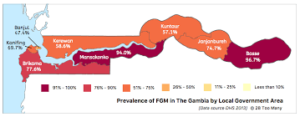Gambia, Senegal to jointly convene Summit on FGM

Dakar, 27 May 2019 – The Governments of Senegal and The Gambia, in partnership with the NGO Safe Hands For Girls, are convening the first African Summit on Female Genital Mutilations (FGM) and Child Marriage (CM).
The meeting will be held on 16, 17 and 18 June 2019 in Dakar at the King Fahd Palace, with the participation of high-level dignitaries from 17 African countries including heads of State and Governments, representatives of continental institutions, United Nations agencies, civil society organizations, experts, as well as survivors, youth, opinion leaders, religious and traditional leaders.
Five hundred participants are expected to attend this Summit whose theme is “Reinforcing the bridge between Africa and the rest of the world to promote an accelerated implementation of a zero tolerance policy on FGMs and CMs, a major focus of the Sustainable Development Goals (SDGs)”.
According to the Minister for Women, Family, Gender and Child Protection of host-country Senegal, Ndèye Saly Diop Dieng, “this summit is, for Senegal, The Gambia and Africa in general, an opportunity to set in motion a continental momentum of coordinated and effective action to end female genital mutilations and child marriages.”
Ms. Jaha Dukureh, Executive director of Safe Hands For Girls, states that the overall objective of the meeting is to “translate into action the commitment of governments, religious leaders, traditional leaders, survivors, CBOs, the media, civil society organizations including youth and women who are working to end FGM and CM in Africa by 2030.
“That is the reason why we want this meeting to be an opportunity to share and build on the experiences and good practices noted in each country, to encourage States to create a legal framework conducive to the elimination of FGM and CM by 2030, and also to develop innovative strategies for the elimination of these harmful practices through coordination and monitoring and evaluation mechanism. This will be done in partnership with the Governments of Senegal and The Gambia, as well as the Al-Azhar Al-Sharif Institute in Egypt, the World Bank, UN Women, UNFPA and African regional organisations,” Ms Dukureh points out.
Ms. Magatte Sy Gaye, Chair of the Summit’s Scientific Committee, notes that despite significant political progress in recent years in combating these problems “the elimination of female genital mutilations and child marriages requires a radical change in social norms and attitudes within the communities”. It is important to leverage political action and more investment to overcome this problem.
During the Summit, discussions will focus on the impact of these harmful, violent, and discriminatory traditional practices on girls that still exist in some countries on the African continent. “The Summit is an opportunity to lay the groundwork for the creation of a regional and global alliance to end harmful practices in relation to female genital mutilations and child marriages by 2030,” the Chair of the Scientific Committee adds.
The African Committee of Experts on the Rights and Welfare of Child (ACERWC), a stakeholder in the event, also advocates for FGM and child marriages to be included in the priorities of the African Union’s Agenda 2063.
The Al Azhar Al Sharif Institute of Egypt, considered the highest authority in Islamic jurisprudence, with great influence in the Muslim world, issued a Fatwa against FGM in 2017. Under the leadership of this institution, represented by a strong delegation of religious leaders, many countries that continue this practice for religious reasons will have access to informed opinions on the subject. The Grand Imam of Al Azhar will chair the session dedicated to religious considerations.
A joint African statement to “end female genital mutilation and child marriage” will be adopted at the Summit to demonstrate the strong political will of African Heads of State and Governments to combat these scourges that affect thousands of young girls.
UNICEF’s “New Statistical Report on Female Genital Mutilation”, published in 2016, highlights that more than 200 million women and girls continue to suffer the effects of FGM in Africa and the world. According to current estimates, 50 million girls are at risk of becoming victims by 2030.
Although the trend in the prevalence of FGM is declining in several countries, there are still pockets of great resistance, particularly in countries such as Somalia, Guinea, Djibouti and Mali.
Every year, more than 12 million girls are forcefully married before the age of 18. These girls then have their right to childhood and education stolen, and their future prospects and advancement limited. In Plan International’s 2016 report entitled “Causes and Consequences of Early and Forced Marriage”, it is stated that forced and early marriages keep girls in conditions of poverty and powerlessness, from generation to generation.
UNICEF’s 2016 report on “The State of the World’s Children” indicates that 39% of girls in Africa are married before their 18th birthday and 13% before their 15th birthday. The statistics can be alarming, but some countries on the continent are able to curb the phenomenon, either in rural or urban areas, or in both at the same time. At least 12 countries have reduced the incidence of child marriage by 10% or more.
For more informations, visit www.africa4girls2030.org
Media: Mr. Faydy Dramé
Tel: 00221 77 5413947 / 781715327 /772807158
Email: amaglobalmedia@gmail.com


Comments are closed.